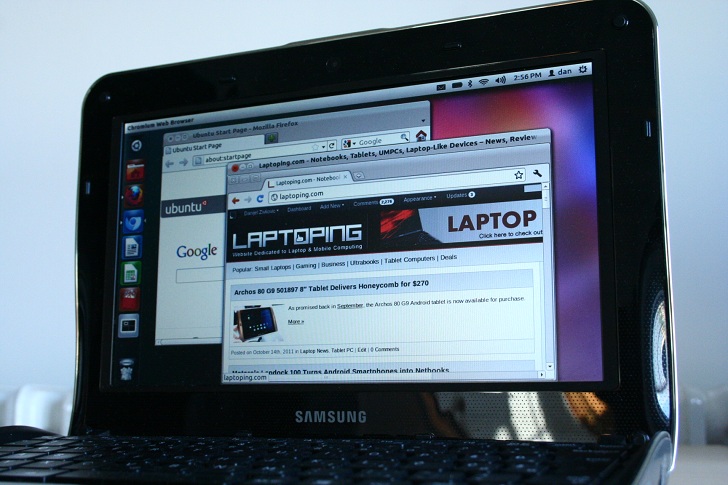Ubuntu 11.10 “Oneiric Ocelot”, the latest version of the most popular Linux distribution among laptop PC users, is now available.
There are many improvements in the new version, including changes in Ubuntu’s Unity interface and various bug fixes. The 11.10 includes new themes and login screen, new features such as Deja Dup backup application, ability to sync installed apps across multiple computers via OneConf feature, and newer kernel version. The default browser is Firefox 7. When it comes to email, Mozilla Thunderbird replaces Evolution client.

Unlike those who nicely presented “Oneiric Ocelot’s” usability and features, in this review we will try to demonstrate performance differences between the latest Ubuntu Linux and Windows for netbook users. As you maybe know, Ubuntu’s creator Canonical and computer maker Asustek have recently announced netbooks with pre-loaded Linux distro, so we assume these benchmarks will be handy for those who plan to buy a Ubuntu netbook, as well as those who will install it themselves.
We tested Ubuntu 11.10 “Oneiric Ocelot” versus Windows 7 Starter Service Pack 1 on a Samsung NF210 Atom N550 dual-core netbook with 2GB of RAM and a 250GB 5,400rpm hard drive.
Browser Speed – Ubuntu Linux 11.10 vs Windows 7 Starter
Since netbooks are primarily used for Internet surfing, we think that the most important test is regarding performance of web browsers – Firefox and Chrome / Chromium.
We used Futuremark’s Peacekeeper benchmark.

These Ubuntu-vs-Windows differences are really impossible to notice in real world browser use, but its of help to see that Chrome and Chromium render webpages faster and are more responsive than Firefox. That difference was noticable under both Ubuntu and Windows and we do recommend you to use Chrome browsers.
Youtube Video Playback
You can’t watch 1080p Youtube videos on an Intel Atom N550 (as same as on the N570 or other older Atoms), because it will look like a slide show, but 720p is not an issue at all on both Ubuntu and Windows. However, we have noticed that during a 2-minute 720p Transformers trailer there were 35 dropped frames under Ubuntu and only 5 dropped frames under Windows. The number of dropped frames is not significant and you will barely notice them – there are 23-25 frames displayed per second.
Hard Drive Performance
For this test, we have copied an 860GB avi file from one place to another, but on the same partition. We did the same with a 1.7GB folder containing about 1,000 smaller files.

Ubuntu is slightly better in this test with 27 seconds and 1min:45secs, respectively, versus Windows’ 30secs and 1:57. The performance is showed in seconds and the lower results are better.
Ubuntu 11.10 vs Windows 7 Starter – GeekBench Benchmark
For general CPU and memory performance benchmarks, the most suitable app is GeekBench, since it can be run on both Linux and Windows, while other benchmark suites can’t.

Ubuntu is faster than Windows, but wierdly, the difference is huge. That’s mostly because of Ubuntu’s big advantage in floating point and memory performance, so if you run some software which heavily depends on these two you might notice the difference. However, that gap isn’t visible in everyday tasks, such as web surfing, email, or in office apps.
Battery Life Benchmark
We have tested the battery life with a DVD-quality movie playback from the hard drive. The screen brightness was set at maximum, sound was on 60%, and Wi-Fi was on. On Ubuntu and its Movie Player the run time was 4 hours and 50 minutes and then the system went to hibernate mode, while on Windows with Media Player the movie played 4 hours and 45 before hibernation. The difference in battery life is minor, but please note that Windows and Ubuntu maybe go in hibernation (due to low battery) at a different battery level. In Windows it’s 10% by default and can be changed within Power Settings, but in Ubuntu this is not accessible (from the graphical user interface, at least). In general, the battery life is almost identical.

The values in the table above are displayed in minutes.
Boot Up and Resume from Sleep Times
In this area, Windows has a small advantage. Ubuntu booted up in 42 seconds, measured from the boot menu to the fully loaded desktop, while Windows did it in 40 seconds. Resume from sleep in Ubuntu lasted about 4 seconds, whereas Windows wakes up in 3 secs.

Again, the performance is displayed in seconds, with the lower numbers meaning better results.
Conclusion
If you like Ubuntu’s look and feel on a netbook and want to switch to it from Windows, you shouldn’t be worried about computing and battery life performance. You will be able to run your everyday tasks at the same speed as in Windows, and even faster in some cases. Switching between app windows in Ubuntu is fast and programs such as a web browser, email client, and office apps start fast and are responsive. However, on Atom-based systems you can’t expect lighting fast speeds and intensive multitasking under Canonical’s nor Microsoft’s OS.

Pelus jeitonzis, istis softis Ubuntu num dá contis du pidaço. Vamus ficá cum windows mésmu.
Dont Look article………UnUsefull……
One thing that surprised me was the boot time. I haven’t tried Oneiric Ocelot personally, but most newbie-friendly Linux distros I’ve used all booted faster than Win7 by at least 20%. By newbie-friendly I mean distros like Ubuntu that come with lots of apps and services included (and started at boot). The D.I.Y types like Arch, Slackware and Debian Unstable are even faster.
Was also a bit surprised Ubuntu did as well in the battery-life department, considering Windows (and the apps included by OEMs sometimes) tends to have more agressive powersaving while Ubuntu and most Linux distros tend to stick with the “ondemand” cpufreq-scaling governor, only going to “powersave” (CPU clocked at 1/2 speed full-time) if you personally set it to do so. You also might want to install Jupiter, which gives quite a dramatic increase in battery life on Linux.
Matti,
Maybe the key for Windows’ fast boot and resume was the fact that I’ve disabled start on boot for all unnecesarry applications (and there were many pre-installed on the netbook) and only left Miscrosoft Security Essentials. In addition, Windows 7 version was Starter, so it maybe helped.
Regarding battery life, I was supprised myself also after reading articles about weak power efficency under Ubuntu 11.10, but it managed to play the movie longer than Win, without any tweaks. Besides this benchmark, I’ve earlier tested 11.04 on the same netbook and the results were the same.